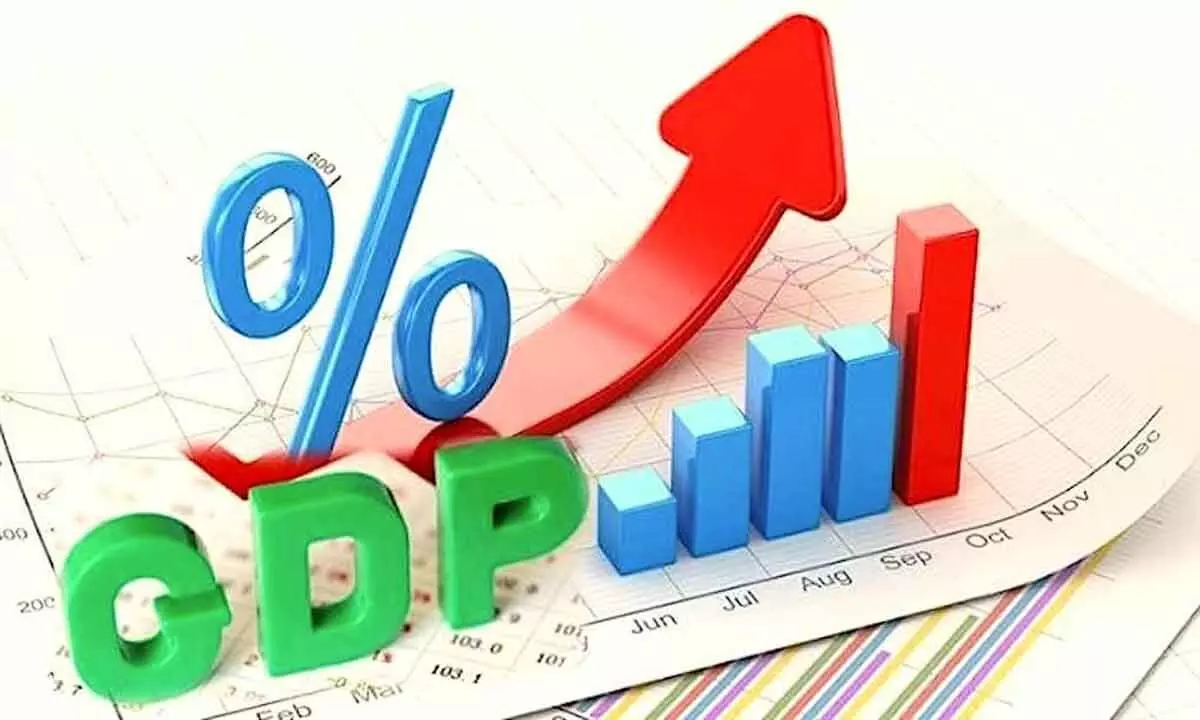Digital infra push to GDP growth

With India’s public digital infrastructure becoming a role model for the world, it has opened up new opportunities for startups. This is bound to lead to higher contribution to GDP growth. The need to focus on enhancing spending on education, health, and other social sectors implies that they must get more budgetary allocations
This week had an encouraging and pleasant news that Real GDP or GDP at constant (2011/12) prices in Q1 in FY 24. It is estimated to attain a level of Rs 40.37 lakh crore, as against Rs 37.44 lakh crore in Q1 2022-23, showing a growth of 7.8 % as compared to 13.2 per cent in Q 1 2022-23. It was expected that Q1 FY 24 will be a reasonable good growth even though it is lesser than last year’s Q1 growth.
Compared to all the developed countries, which are experiencing exceptionally low growth and parallel inflation not coming under control to their expected and targeted level, with the forecast that the quantitative tightening and interest rate hike will continue to hike for sometime to tame inflation, the growth of those countries are suffering. It is expected that global growth continues to remain on shaky grounds as a recent report indicates that manufacturing activities have suffered in the US, Europe and China, whose economy has been suffering with the fall in demand from the global economy.
The weakness in China’s economic activities will impact global industrial and investment. In July, BOE, Fed, and ECB hiked rates by 25 basis points each. It is believed that this fight against inflation will continue which will have further impact on global growth.
We have to look at our Q1 FY 24 GDP growth from this perspective of slowdown in world GDP growth. Indian GDP growth will also moderate against export-led growth due to lesser global demand. Let us look at the components of GDP growth in India-there has been better growth in agriculture at 3.5% this quarter as compared to the first quarter of the last year at 2.4%; mining and quarrying and manufacturing have shown growth rate of 5.8% and 4.7% this quarter as against last year’s first quarter growth of 9.5% and 6.1%, respectively.
Similarly, electricity, gas, water supply and other utilities and construction have shown substantial lower growth of 2.9% and 7.9% this first quarter as compared to first quarter of the last year at 14.9% and 16.0%, respectively.Trade, hotels, transport, communication and services related this Q1 24 at 9.2% as against Q1 23 at 25.7%. There has been better growth at 12.2% Q1 24 in financial, real estate and professional services as against 8.5% first quarter of the last year. Overall, the GDP growth Q124 is at 7.8% as against first quarter last year level of 13.1%.
When we look at nominal GDP or GDP at current prices in Q1, 2023-24 is estimated at 70.67 lakh crore as against Rs 65.42 lakh crore in Q12o22-23, showing a growth of 8% as compared to 27.7% in Q 2022-23. Normally nominal growth will be much higher than real GDP and in this quarter the difference is substantially lowered. All the components of growth have shown substantial lesser growth as compared to last year first quarter level.
The GST collection for August has been put at Rs 1.59 lakh crore. Even though it is a three-month low, it is still showing a growth rate that is 11% higher than the last year. PMI August rose to 58.6 showing rising new orders and enhanced manufacturing activities. There is a peak power demand of 249 GW as on September 1, thereby showing an all-time high demand for power resulting in up 12.9% in coal production at 67.7 mt. Electricity consumption has been high at 152b units from 130b a year ago. There is a rise in jet fuels at 9.5%. Railway freight is on an increase from 126.9 mt from 119.3 mt a year ago.
There has been robust August sales for auto sector at monthly dispatches numbers ever at 3,69,00 and this shows good sign of demand for the festival season. UPI transactions hit a new high in August at Rs 1000 crore and in value terms Rs 15.76 lakh, which is also a new high. The other indicators that have been released also indicate that Indian economy is on firm ground.
It is heartening to note that Moody’s has raised India’s GDP growth forecast to 6.7% for the current year as against the earlier projection of 5.5%, in the background of the country’s economy recording a growth of 7.8% for the June quarter ‘23/24. The rating agency, however, has lowered the 2024 forecast to 6.1% from 6.5%.
So what then are the worries? Inflation is still not yet fully under control. Rainfall is still deficit, which has resulted in reduced growing of pulses in Karnataka, Madhya Pradesh and Maharashtra. It is expected that with the steps taken by the government to improve supply of food grains, the inflation will slowly moderate.
India had to take advantage of the opportunity to further gear up the drivers of growth with government and private sector investments and prepare well for an impressive performance in its Amrit Kaal.
We need to focus on investments in rural economy, which results in greater rural demand. We have to supplement rural income along with agricultural income. Our efforts to enhance our share of GDP from manufacturing have to continue further as this provides employment opportunities to the urban youth. Our dominance in exports of services will have to be enhanced with further investment in innovation and R&D. With the additional demand and improved demand for discretionary and non-discretionary spending, private sector has to show the way in investment along with Government spending more on capex consistently in the recent period thereby improving substantial physical infrastructure which reduces reduction of logistics cost and substantially improve connectivity.
With India’s public digital infrastructure becoming a role model for the world, it has opened up new opportunities for startups. This is bound to lead to higher contribution to GDP growth. The need to focus on enhancing spending on education, health, and other social sectors implies that they must get more budgetary allocations.
India should build up new leaders in all sectors and provide new leadership to the world during Amrit Kaal.
Right policies, right direction and right approach and actions by all stakeholders should help achieve these goals. At the same, we should strive for sustainable, inclusive and equitable growth leading to per capita income rising and India becoming a developed economy.








